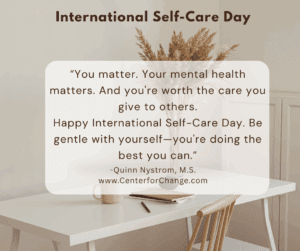Please note that this is an Archived article and may contain content that is out of date. The use of she/her/hers pronouns in some articles is not intended to be exclusionary. Eating disorders can affect people of all genders, ages, races, religions, ethnicities, sexual orientations, body shapes, and weights.
By Quinn Nystrom, MS
Let’s be honest—”self-care” can sound like one of those buzzwords that gets thrown around a lot, especially on social media. Bubble baths, candles, yoga poses—it’s easy to think it’s all fluff. But July 24th, International Self-Care Day, is about something much deeper and more important—you, your health, and your well-being, especially when life feels heavy or overwhelming.
For those of us living with mental illness, self-care isn’t just a nice-to-have. It’s a lifeline. It’s about tuning in, showing up for ourselves in small ways, and finding sustainable routines that help us cope, heal, and even thrive—even when our minds are working against us.
What Is International Self-Care Day?
International Self-Care Day (ISD), celebrated annually on July 24, serves as a global reminder that taking care of ourselves isn’t just a personal choice; it’s a crucial part of maintaining our overall well-being.
Why July 24th? Because self-care is something we need 24/7, not just once a year. The date symbolizes the idea that we deserve to care for ourselves every day throughout the year.
And it’s not just about the body. Self-care also plays a significant role in supporting mental and emotional health, which is often overlooked.
 Self-Care: More Than Just Spa Days
Self-Care: More Than Just Spa Days
Let’s bust a myth real quick: self-care isn’t selfish, and it isn’t always soft or luxurious. Sure, a good nap or a warm bath can help, but self-care also includes:
· Eating in a way that fuels your brain and body
· Setting a boundary with someone who drains you
· Moving your body in whatever way feels accessible
· Getting enough sleep (or trying to improve it)
· Saying no when you need to
· Going to therapy, taking your meds, or attending a support group
· Logging off when doom-scrolling becomes overwhelming
It’s about building habits that support you rather than punishing or pressuring you.
Self-Care and Mental Health: The Connection
When you live with anxiety, depression, bipolar disorder, PTSD, or an eating disorder—or any other mental health condition, self-care can be the difference between survival and burnout. It helps create some much-needed stability, a sense of control, and moments of relief in the chaos.
Small things can make a big impact:
· Journaling to process thoughts and feelings
· Drinking water (seriously, hydration helps)
· Planning breaks during your workday
· Talking to someone who listens without judgment
Self-care doesn’t cure mental illness. But it can support your healing. It reminds you that you deserve to feel better, and you’re allowed to take up space—even when your brain says otherwise.
When Self-Care Feels Hard
Let’s be real—it’s not always easy to take care of yourself when you’re in a dark place. Getting out of bed, brushing your teeth, and making a meal—these things can feel impossible. And that’s okay.
Bare-minimum self-care is still self-care. On your worst days, success might look like:
· Sending a one-word text to a friend
· Lying in the sun for five minutes
· Putting on clean clothes (or not, and forgiving yourself)
You’re allowed to start small. You’re allowed to rest. And most importantly, you’re allowed to be kind to yourself—even if you didn’t do “all the things.”
Why It Matters (Now More Than Ever)
We’re living in a world where stress, anxiety, and burnout are at an all-time high. Healthcare systems are stretched thin, and so many people are struggling silently. By prioritizing self-care, we alleviate some of that pressure, not only for ourselves but also for our communities.
And for those of us managing mental illness, self-care isn’t optional—it’s survival. It’s resistance. It’s hope.
So, this International Self-Care Day, take a moment. Check in with yourself. Do one small thing that helps you feel even a little bit more okay.
You matter. Your mental health matters. And you’re worth the care you give to others.
Happy International Self-Care Day. Be gentle with yourself—you’re doing the best you can
















